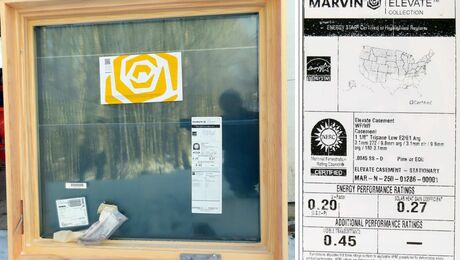Does the Rinnai Tankless Water heater fall under the category of “solar hot water heater”?
I have heard rave reviews about the Rinnai Tankless hot water heater. I would like to know if it is better than other options that may be given a more general name of “solar hot water heater”. I believe the solar hot water heaters are much more expensive. Please clearly define some specific name brands and general prices of solar hot water heaters.
GBA Detail Library
A collection of one thousand construction details organized by climate and house part









Replies
A Rinnai tankless water heater is not a solar water heater. Tankless water heaters can be fueled by natural gas, propane, or electricity.
Solar water heaters have many components, including a rooftop or ground-mounted collector (or collectors), a solar storage tank, and a pump to circulate fluid between the two. Since solar water heaters can't make hot water during cloudy weather, most homes with a solar water heater also have a backup system. A tankless water heater can be used to back up a solar water heater.
Tankless water heaters cost between $800 and $1,800. The installed cost of a solar water heater is generally in the $5,000 to $9,000 range.
A Rinnai is a form of demand water heater that burns propane or natural gas to heat water as you need it. (thus the term Demand) it doesn't have a tank and is often referred to as a tankless water heater. Rinnai is the market leader (and I'm a certified Rinnai installer and a licensed plumber) but there are several other companies that also make good units like this, most notably Tagaki, Noritz and Rheem. These products are generally about 86% efficient and the exhaust gasses are hot enough that the exhaust pipes need to be supplied by the same manufacturer that supplies the water heater. they are sealed combustion devices, they get their combustion air from an air jacket that surrounds the flue in a concentric pipe with-in a pipe configuration. For this reason any installation that is not on an exterior wall such as an attic roof terminal can get difficult and expensive.
There are also several companies who make condensing demand water heaters, most notably Navien and Quietside (my current favorite). These items are up to 95% efficient and their exhaust is so cool that they can vent through standard 3" PVC pipe. They are also sealed combustion and get their combustion air from 3" PVC as well. They require a condensation drain and the condensate is acidic so it needs to drain to a place where it won't harm siding or paving such as the gutter drain.
It is also possible to purchase electric tankless water heaters but I generally don't recommend them because the wires they require are so heavy that they can get very expensive and I see electricity as too precious to waste on heating water. Here as in many places in America the bulk of our electricity comes from coal fired generators. for 100 BTUs of energy extracted at the coal mine we can deliver 30 BTUs at the home 70 BTUs are lost to the inefficiencies of the system. I would not be comfortable putting three gallons of gas in my car and pouring seven out on the ground. Lets save the electricity for things we can't do with natural gas or propane.
If you are in an area that has abundant sustainably generated electricity look at the Marathon brand super efficient water heater. http://www.marathonheaters.com
Solar water heaters may be more expensive to buy up front but every BTU that comes from the sun is a BTU that doesn't come from fossil fuels or our electric grid. I think a home with a solar water heating system represents a very smart investment in light of the predicted increase in fuel costs in the next five to ten years and is similarly a smart resale value decision. Every house I build includes one.
I had someone install a ODW-199A in my home. The total cost was $2,300. The thing is a piece of crap!!! It takes an extra 2 minutes to start getting hot water after you turn on the facet. If you turn the facet on low and the unit is cold, the unit shuts down and you need to go down into the basement a restart the unit. Happens about 2 - 5 times a day. Do not buy one of these pieces of crap. Buy a cheep hot water tank. You will get hot water when you want it and save yourself a lot of money!!!!
Actually, you waste far more than that. An internal combustion engine averages no more than 20% thermal efficiency, and a good deal of that is lost to drive-train inefficiencies, wind resistance and tire friction (as well as bad driving practices).
Kelly,
You are likely one of many "victims" of a poor match between heating unit and distribution system. An efficient hot water system must also include proper pipe sizing, short piping runs with minimum angular changes, pipe insulation, and fixture flow rates matched to the minimum supply flow rates.
Tankless water heaters are one of many overhyped and underperforming appliances. They are very costly to install, are highly susceptible to hard water deposition and quick loss of efficiency, require minimum flow rates and hence are incompatible with water-saving fixtures, and have limited maximum flow rates that cannot always provide sufficient hot water for multiple users. The fuel savings are often less than expected and financial payback is not likely to occur during the useful life of the appliance.